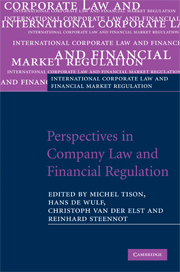Book contents
- Frontmatter
- Contents
- List of contributors
- Foreword
- PART I Perspectives in company law, SECTION 1: European company law: regulatory competition and free movement of companies
- PART 1 Perspectives in company law, SECTION 2: Corporate governance, shareholders' rights and auditing
- PART 1 Perspectives in company law, SECTION 3: Takeover law
- 19 Adoption of the European Directive on takeover bids: an on-again, off-again story
- 20 Application of the Dutch investigation procedure on two listed companies: the Gucci and ABN AMRO cases
- 21 Obstacles to corporate restructuring: observations from a European and German perspective
- 22 Protection of third-party interests under German takeover law
- 23 Takeover defences and the role of law: a Japanese perspective
- PART II Perspectives in financial regulation, SECTION 1: European perspectives
- PART 2 Perspectives in financial regulation, SECTION 2: Transatlantic perspectives
- PART III Miscellaneous
- Index
- References
21 - Obstacles to corporate restructuring: observations from a European and German perspective
from PART 1 - Perspectives in company law, SECTION 3: Takeover law
Published online by Cambridge University Press: 04 August 2010
- Frontmatter
- Contents
- List of contributors
- Foreword
- PART I Perspectives in company law, SECTION 1: European company law: regulatory competition and free movement of companies
- PART 1 Perspectives in company law, SECTION 2: Corporate governance, shareholders' rights and auditing
- PART 1 Perspectives in company law, SECTION 3: Takeover law
- 19 Adoption of the European Directive on takeover bids: an on-again, off-again story
- 20 Application of the Dutch investigation procedure on two listed companies: the Gucci and ABN AMRO cases
- 21 Obstacles to corporate restructuring: observations from a European and German perspective
- 22 Protection of third-party interests under German takeover law
- 23 Takeover defences and the role of law: a Japanese perspective
- PART II Perspectives in financial regulation, SECTION 1: European perspectives
- PART 2 Perspectives in financial regulation, SECTION 2: Transatlantic perspectives
- PART III Miscellaneous
- Index
- References
Summary
In Europe there are still many obstacles to corporate restructuring, even beyond the takeover context. The experience with the implementation of the 13th Directive on Takeovers is sobering indeed. The number of Member States implementing the directive in a seemingly protectionist way is unexpectedly large. This is in line with a growing popular fear of globalization and definite trends toward political protectionism regarding foreign investments in various Member States. Germany is not an exception, as the Risk Limitation Act of July 2008 and the ongoing discussion on further restrictions illustrate. The declaration by Commissioner mccreevy of 3 October 2007 that there will be no European action on the issue of one-share/one-vote should not mean the end of the discussion. The report of the European Corporate Governance Forum Working Group on Proportionality of June 2007 is right in pleading for an enhanced disclosure regime concerning control-enhancing mechanisms. In any case, there is a definite need for more data and further analysis.
Introduction
The topic of this chapter is ‘Obstacles to Corporate Restructuring’, with an emphasis on takeover rules and the market of corporate control. There are two underlying implications to this choice: first, that takeovers play or can play an important role in corporate restructuring; and second, that there are other important parameters for corporate restructuring beyond takeovers. Let me make two preliminary remarks on this.
- Type
- Chapter
- Information
- Perspectives in Company Law and Financial Regulation , pp. 373 - 396Publisher: Cambridge University PressPrint publication year: 2009
References
- 2
- Cited by



